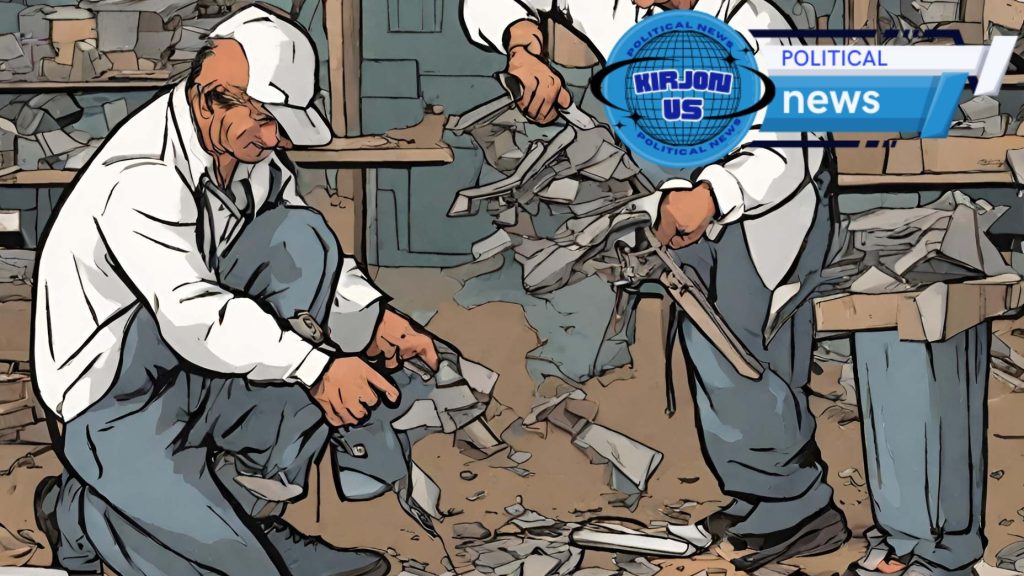Sepp Eisenriegler, the visionary behind Vienna’s Repair and Service Center (R.U.S.Z.), is a beacon of hope for both defunct appliances and unemployed individuals seeking a second chance. Established in 1998, R.U.S.Z. serves as a sanctuary for not only broken electronics but also as a training ground for hundreds of skilled repairers. Eisenriegler’s passion extends even to his loyal canine companions, who faithfully accompany him through the bustling corridors of his repair haven.
The Shift Towards Repair

While Eisenriegler’s journey hasn’t been devoid of challenges, recent years have witnessed a remarkable shift in attitudes towards repair. The onset of the Fridays for Future movement, spearheaded by impassioned students advocating for climate action, marked a turning point. Eisenriegler noticed a surge in participation at the weekly repair café and an influx of clients at the repair shop. Then, the global pandemic further fueled this momentum as individuals sought to economize by opting for repairs over replacements. With ample time on their hands, people unearthed forgotten treasures from their garages and attics, breathing new life into sentimental possessions through repair.
Vienna’s Innovative Repair Bonus
In 2020, Vienna unveiled a pioneering initiative known as the Reparaturbon (Repair Note) pilot program. Aimed at promoting repair culture and bolstering local businesses, the program subsidized 50 percent of repair costs, capped at €100 per repair. This initiative, which covered a diverse range of items including clothing, electronics, bicycles, and furniture, garnered widespread success. Over 35,000 items underwent repair, resulting in a significant reduction of 850 tons of CO2 emissions. Unlike previous schemes entailing bureaucratic hurdles, Vienna’s model streamlined the process, enabling customers to pay only half the repair costs upfront, with the remainder reimbursed directly to the repair shop. Moreover, in January 2021, Austria implemented reduced VAT rates on repairs of bicycles, shoes, and clothing, further incentivizing repair over replacement.
National Expansion: A Focus on E-Waste

Building upon the success of the Vienna repair bonus, Austria is poised to launch a national repair bonus initiative in April. This expanded program will specifically target electronic and electrical equipment, aiming to tackle the burgeoning issue of E-waste. With E-waste constituting the fastest-growing waste stream in developed nations, Austria’s initiative seeks to subsidize 50 percent of repair costs, capped at €200 per repair. By incentivizing the repair of electronic devices, this initiative endeavors to mitigate the environmental impact of rampant consumerism.
Overcoming Cost Barriers
Chloé Mikolajczak, a prominent advocate for the Right to Repair Europe, identifies cost as a significant deterrent to repair adoption. Research indicates that when the cost of repair exceeds 30 percent of the price of a new product, consumers are inclined to favor replacement. Eisenriegler echoes this sentiment, citing instances where customers opt for new purchases due to perceived cost discrepancies. However, initiatives like the repair bonus foster a shift in mindset, gradually eroding the perceived cost barriers associated with repair.
Towards Systemic Change
While the repair bonus serves as a vital interim measure, Markus Piringer emphasizes the need for systemic change. Beyond incentivizing repair through subsidies, Piringer advocates for comprehensive reforms encompassing right to repair legislation, equitable access to spare parts, and environmental tax restructuring. Eisenriegler concurs, regarding the repair bonus as a necessary corrective measure in light of market failures perpetuated by cheap, disposable products and exorbitant repair costs.
Global Replication and Future Prospects

The success of Vienna’s repair bonus has reverberated beyond its borders, inspiring emulation in locales such as Thüringen and Portland, Oregon. Eisenriegler envisions a future where repair culture permeates every facet of society, facilitated by initiatives like vocational training programs for the unemployed. As the EU contemplates broader right to repair legislation and environmental taxation reforms, the groundwork is laid for a paradigm shift towards sustainable consumption practices.
Conclusion
Vienna’s repair bonus exemplifies a concerted effort to combat consumerism’s adverse environmental impacts while empowering marginalized communities. Through targeted incentives and systemic reforms, initiatives like these pave the way for a future where repair, not replacement, emerges as the cornerstone of sustainable living. As Eisenriegler’s tireless advocacy demonstrates, the journey towards a repair-centric society is not merely a dream but an achievable reality, one repair at a time.
Faqs
What is the Vienna Repair Bonus Program?
The Vienna Repair Bonus Program, also known as Reparaturbon, is an innovative initiative launched by the city of Vienna to promote repair culture and support local businesses. Under this program, individuals are eligible for subsidies covering 50 percent of repair costs, with a cap of €100 per repair.
What items are covered under the Repair Bonus Program?
The program covers a wide range of items, including but not limited to clothing, electronics, bicycles, and furniture. The aim is to incentivize repair across various product categories, thereby reducing waste and environmental impact.
How does the Repair Bonus Program work?
Customers seeking repair services simply need to pay half of the repair costs upfront, with the remaining amount reimbursed directly to the repair shop by the city of Vienna. Unlike previous schemes characterized by bureaucratic hurdles, the process is streamlined to ensure ease of access and participation.
What are the environmental benefits of the Repair Bonus Program?
By promoting repair over replacement, the program contributes to significant reductions in CO2 emissions and waste generation. Through the repair of thousands of items, the program has already saved hundreds of tons of CO2 emissions and diverted substantial waste from landfills.
Is the Repair Bonus Program only available in Vienna?
While the program originated in Vienna, its success has spurred interest in replication beyond the city limits. Similar initiatives have been launched in other regions, both nationally and internationally, inspired by Vienna’s model of incentivizing repair and fostering sustainable consumption practices.
How long will the Repair Bonus Program be available?
The Repair Bonus Program in Vienna is expected to run until 2026, with funding allocated from the EU Covid-19 recovery fund. However, its continuation beyond this period will depend on various factors, including the program’s effectiveness and public support.
How can individuals support the Repair Bonus Program?
Individuals can support the program by actively participating in repair initiatives, patronizing local repair shops, and advocating for similar programs in their own communities. By choosing repair over replacement, individuals contribute to the broader goal of sustainable consumption and environmental stewardship.







